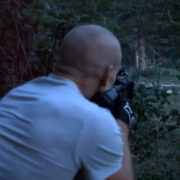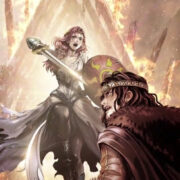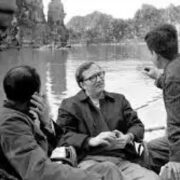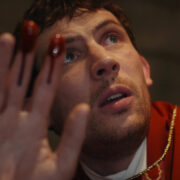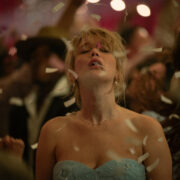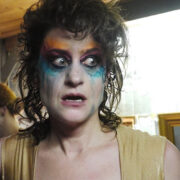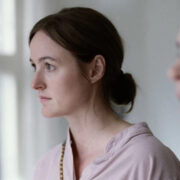INVENTION: Alice’s Adventures in Conspiracy Theory
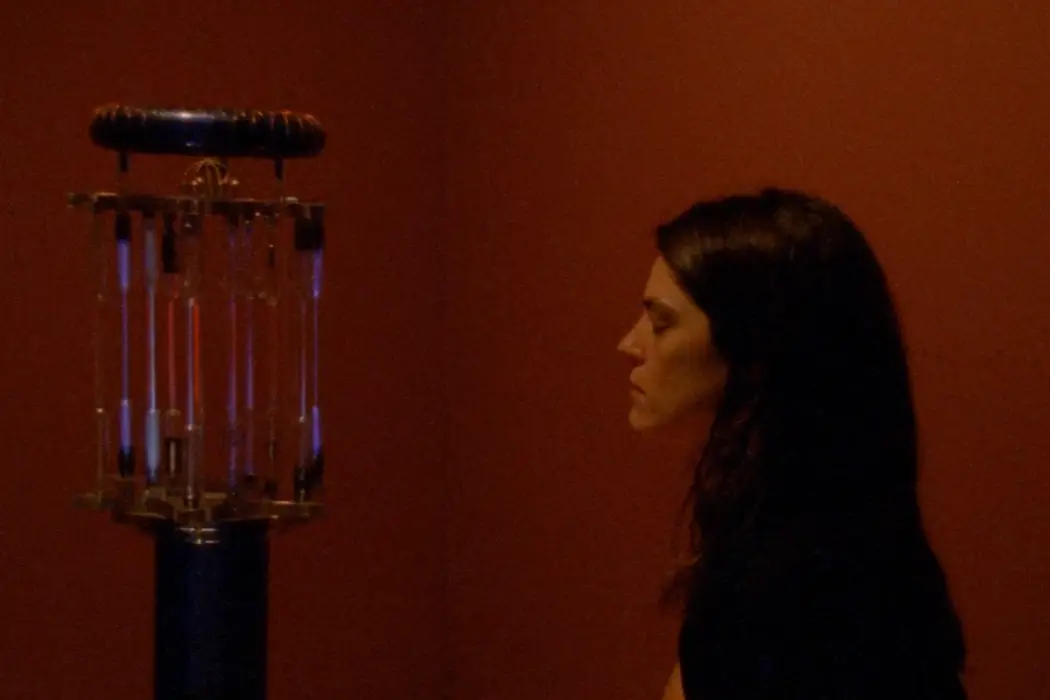
Payton McCarty-Simas is a freelance writer and artist based in…
In Invention, an airily shaggy, collaborative piece of improvised, genre-fluid auto-fiction by documentarian Courtney Stephens and actress Callie Hernandez (La La Land, Alien: Covenant), a grieving daughter falls down a low-key conspiracy rabbit hole of the kind we rarely see today. Based on the women’s personal experiences with losing their fathers, one of whom was a New Age health guru whose TV appearances are featured in the film, Invention delves into the more traditionally left-leaning, New Age side of conspiratorial thinking: when a loosely fictionalized version of Hernandez named Carrie goes to clean out her recently deceased father’s house in Massachusetts, she’s bequeathed the patent for a “healing energy” machine he invented and sold even after its FDA review failed. Contending with the crushing blend of grief and banality that follows a death, and getting to know more about her father’s life in the process, she slowly befriends the oddballs in his orbit, all of whom espouse mild-mannered belief in things like reiki, “healing vibrations,” and the shadow government.
Down the Rabbit Hole
The filmmakers frequently pause the action with meta-documentary passages featuring conversations about the real experiences and conspiracy beliefs behind the story, scene directions, and deadpan jokes that add both levity and depth to the loosely-staged proceedings. Invention is a refreshingly experimental, honestly curious look into the kinds of New Age fringe beliefs more common to a time when healing crystals didn’t necessarily bring QAnon, Russell Brand, or gutting HHS immediately to mind, before the so-called “crank realignment” dragged this always-perilous national pastime out of the farmer’s market fringe (think Janet Planet) and into the increasingly extreme political mainstream. Meditating on the way our nation’s “disappointment infuses the culture with hopeful fictions and toxic nostalgia” today, it’s an engrossing piece of off-kilter, Jarmusch-y filmmaking that feels eminently familiar– and eminently American.

Invention is, at its heart, a collage of low-fi Americana. While the film is set in the present, the mise-en-scène and cinematography conjure an almost Hudson River School style atmosphere, full of rambling New England farmhouses (like the one Carrie’s father bought but couldn’t afford), dusty antique shops (like the one his friends/dubious backers of his “schemes” run), and lovely autumnal vistas, hazily shot on Super 16mm. At the same time, the filmmakers’ liberal use of archival footage from the ‘90s, both home video and TV clips, add a decidedly kitschy, low-res counterpoint amplified by the sci-fi McGuffin–– the invention–– at the film’s center. This combination is ambivalent, as homey as it is alienating, bringing out the strangeness of our particular brand of sceptical capitalist individualism with an open heart and a raised eyebrow. Talk radio mumbles from truck stereos; men in repair shops offer Carrie prayers; airline reps dicker with her over skimpy “bereavement discounts;” daytime TV hosts discuss the dangers of fluoride and hawk “bio-feeding devices”; old-timers earnestly explain that the Washington Monument represents “the lost penis of Osiris.”
Curiouser and Curiouser
One of the film’s most commendable aspects on this score is its lack of condescension towards the types of people it depicts, folks often treated with light, if affectionate, mockery in films like BJ Novak’s Vengeance. Characters and crew members alike discuss the American Dream with wry distance but without a hint of irony, taking its characters’ fears and aspirations seriously. Ultimately they suggest that, for many, the American Dream seems to be a blend of hope run through with paranoid supernaturalism and laissez-faire opportunism that often curdles into pure hucksterism: “Your dad, do you think he was the kind of person who believed in the American dream?” a crew member asks. “No, I think he believed in his own dreams,” Hernandez responds, an answer that conflates the two in a film that foregrounds its sense of national identity so strongly. “Do you believe in his dreams?” he asks. “No,” she replies. Nevertheless, her character finds herself drawn to his way of thinking, helping his “patients” use his non-FDA-approved invention, almost despite herself, sinking into their milieu to escape from her grief.
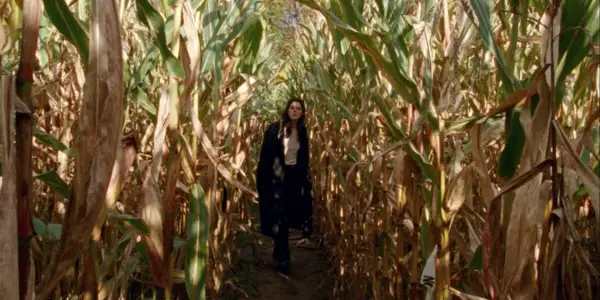
The choice to empathetically follow her father down the rabbit hole, even as an observer, evinces a commendable desire to understand others’ ways of being despite the pain they can so obviously bring. It also speaks to the gentle, witty spirit of Hernandez and Stephens‘ film, which takes its cues from Alice in Wonderland (somehow without being hack, itself a small miracle). A centerpiece sequence is set in a corn maze, where Carrie explains her father’s descent into conspiracism for the first and only time. She and Sham, a hulking man of few words (played with a mellow, magnetic presence by Sahm McGlynn) with whom she soon falls into a casual relationship, are lost. They sit at a tableaux of the Mad Hatter’s Tea Party, plastic cups filled with rain, the Cheshire Cat languishing on a pole amidst the cornstalks. Earlier, a player piano at a funeral home bubbles out a jazzy organ version of “The Star Spangled Banner” before switching to “The Unbirthday Song.”
This parallelism, Alice’s dreams and Americans’, works on the basis of the film’s idiosyncratic, deadpan tone and earnest curiosity, both held up by Hernandez’ arresting performance. This fictive version of her is all ears and big, tired eyes, soaking everything in and giving nothing away. Characters discuss who’s “open” to talking about conspiracy and who’s a “concrete person,” or closed-minded, unsaleable, stone-hearted. “Intuition,” Hernandez‘ real father wrote in his notebook, “= internal knowingness, for example, a feeling. Be connected and know truth. Connected to what? To the universe (me).” That could be this film’s guiding principle, centering its improvisational method and Socratic, meta-discursive frame. Carrie, like Alice, then, meets the world and the motley crew that lives there as it is, takes a look around and, with little other recourse, says: “curiouser and curiouser.” As David Cronenberg said recently of his own conspiracy film made while processing the death of his wife, conspiracy can be a “grief strategy.”
Invention screens at Metrograph in NYC on April 18, 19, and 20. Check out our interview with Courtney Stephens and Callie Hernandez here!
Does content like this matter to you?
Become a Member and support film journalism. Unlock access to all of Film Inquiry`s great articles. Join a community of like-minded readers who are passionate about cinema - get access to our private members Network, give back to independent filmmakers, and more.
Payton McCarty-Simas is a freelance writer and artist based in New York City. They grew up in Massachusetts devouring Stephen King novels, Edgar Allan Poe stories, and Scooby Doo on VHS. Payton holds a masters degree in film and media studies from Columbia University and her work focuses on horror film, psychedelia, and the occult in particular. Their first book, One Step Short of Crazy: National Treasure and the Landscape of American Conspiracy Culture, is due for release in November.


